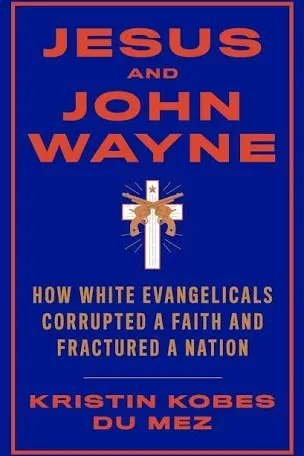Jesus and John Wayne
Have any of you read Jesus and John Wayne by Kristin Kobes Du Mez? It is important and certainly worth your time. You can listen to it on Hoopla or Audible if you don’t want to read it, but if you think you aren’t interested, I urge you to listen or read the introduction to the book. I was not planning to read it until I overheard the intro while Wayne listened to it. I was sold immediately. The intro is loaded with information and you will be able to decide quickly if you want to keep reading.
Du Mez is a Christian and teaches at a Christian university, but she is not a theologian. She is a historian. So she was able to step back from the evangelical culture of the last 75 years or so and evaluate with a historian’s eye. All her sources are heavily documented and footnoted, so this is not her opinion on what influenced evangelical culture. It’s a pretty objective view and goes very deep. As a student of evangelical Christianity for the past 35 years, I was aware of most of what she references, but she dug up some factors I had never even heard of.
What I DIDN’T know that she showed me was how much our spiritual beliefs and practices have been influenced by the culture over the last 75 years. The church is supposed to stand apart from the culture and offer an alternative way of life, “in the world but not of the world.” But it’s clear from this book that our predecessors in the evangelical church were heavily influenced by culture, not scripture. And we are continuing that pattern because we are not aware of it. I was deeply disappointed to recognize ways I had been snookered into believing things that aren’t biblical because I trusted these sources.
One of the first examples Du Mez gives is the popularity among men’s Bible studies of the book Wild At Heart by John Eldredge. Although this book has very few scriptural references, it became accepted as the handbook for how to be a man of God. The problem is that it promotes a worldly view of masculinity that left many men feeling they didn’t fit the mold, they were deficient, failures at being godly men. Some men have conveyed the pain this caused them, feeling alienated from the church and from what they thought God wanted them to be like.
If you’ve read the book, I’d love your feedback on what you learned or saw that surprised you.




